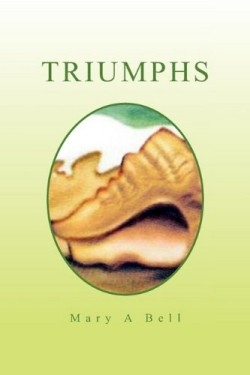Triumphs
Although this collection is inconsistent, with works of quality and originality juxtaposed with pieces of clichéd phrasing and tired imagery, by and large Triumphs soothes, uplifts, and inspires gratitude and good works. Mary A. Bell is a teacher and state clerk, who holds a Master of Arts degree from the University of Oregon. Here, she includes both poems and short stories.
The stories add nothing to the value of the book: they are awkward retellings of tales from the Hebrew Bible and popular song, and do not flow with natural dialogue or language. It is in her poems, especially her sonnets, that Bell offers tones of clarity and beauty.
In her sonnets, Bell observes the traditional form of fourteen lines with regular rhymes and a twist in a couplet at the end. She doesn’t always follow classical rhyme schemes, but that departure from convention does not weaken the poems. In “Spring at Last,” she describes a dream of a season of warmth and beauty blossoming in herself: “The naked trees dressed green; my nearly dead / Belief stirred with new hope the dream was true. / You came when I had learned to love and care / For shivering ones around me; spring was fair.”
The poet trusts her readers in “Fingers,” allowing the poem’s title and imagery to carry the meaning without spelling it out: “The ten servants call forth / Music of joy and praise from strings / Stitch garments of warmth and dignity, / Caress with love and comfort.”
Bell also includes several clever poetic responses to such authors as Poe, Frost, and Francis Scott Key. “False Premise” begins slyly: “Two starting paths lay at my feet. / I took the wider and the more complete.”
The weakest pieces are those in which the poet extols her religious faith; her verse then falls into cliché and her vocabulary choices become ironically more mundane. For instance, she characterizes Jesus as “sinless in a world of sinners. / He was different.” In “OK – Not OK” she writes: “With that he healed my soul; Now I’m OK, and you can be so too.”
The more effective religious poems encourage enacting faith through service to others. Without preaching, Bell inspires a desire to give from one’s own abundance. In the beautiful, brief “Harvest,” she writes, “Bodies can be fed with turkeys; Let me also help a soul to soar with eagles.”
While not a literary triumph, this is overall a worthwhile volume, since the power and beauty of the best poems overshadow the mediocre pieces. Bell rings out some small triumphs of the human spirit.
Reviewed by
Karen McCarthy
Disclosure: This article is not an endorsement, but a review. The publisher of this book provided free copies of the book and paid a small fee to have their book reviewed by a professional reviewer. Foreword Reviews and Clarion Reviews make no guarantee that the publisher will receive a positive review. Foreword Magazine, Inc. is disclosing this in accordance with the Federal Trade Commission’s 16 CFR, Part 255.


